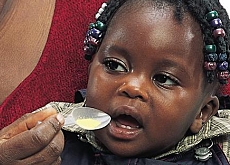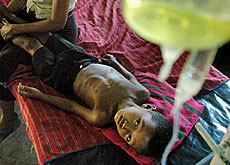Novartis cuts price of anti-malaria drug

Swiss pharmaceutical giant Novartis has announced an immediate reduction in the price of its anti-malarial medicine Coartem for the public market.
By cutting the cost of each treatment by more than a third to an average $1 (SFr1.25), the company says it is trying to improve access to the therapy in low-income regions, particularly Africa.
According to the World Health Organization (WHO), malaria continues to be responsible for at least one million deaths a year. The disease disproportionately affects youngsters and adolescents in Africa, where it kills a child every 30 seconds.
“The dramatic increase achieved in our production capacity, thanks to an improved supply situation for the natural ingredient artemisinin, provides us with an opportunity to further accelerate access to Coartem in combination with a price decrease,” said Daniel Vasella, chairman and CEO of Novartis on Friday.
“The compelling need for an inexpensive and highly effective malaria treatment, especially in low-income countries, prompted our decision to provide Coartem below our costs. I am very pleased that the WHO and other organisations such as Unicef and Médecins Sans Frontières can now become even more effective in rolling back malaria,” he added.
The average price per treatment is now $1 compared with the previous price of $1.57.
Novartis, the fourth largest pharmaceutical company in the world in terms of sales, has been providing Coartem at no profit since 2001 in collaboration with the WHO.
Non-governmental organisations were cautiously positive towards the news.
“If the reduction in the price helps to increase the availability of ACT [artemisinin combination therapy] drugs in the field, then it’s welcome. But what we want to see is that the new ACT drugs are deployed in the field as soon as possible,” Pere-Joan Pons from Médecins Sans Frontières told swissinfo.
“Over the past two years I’ve been in countries like Uganda, Niger and Cameroon and the reality is that in the field we at Médecins Sans Frontières use ACTs to treat patients but in most of the public health facilities there are still no ACTs – that’s the important point.”
Impact
Novartis says this price reduction is expected to have the greatest impact on children, who are the majority of malaria patients.
About 75 per cent of all patients taking Coartem are children and adolescents. Countries will now be able to treat twice the number of children under age five with the same amount of funds.
Deliveries for the drug have steadily climbed over the last two years – from four million treatments in 2004 to well over 40 million treatments so far in 2006. Based on orders at hand, Novartis says deliveries are expected to reach 50 million treatments by the end of October.
In May this year the company announced it was spearheading a new public-private partnership aimed at discovering a new generation of malaria treatments.
The Singapore-based Novartis Institute for Tropical Diseases would take the lead in developing new drugs together with the Swiss Tropical Institute and other institutions.
The firm said it would provide industry expertise and open up its extensive library of compounds to its partners.
swissinfo with agencies
There are an estimated 300-500 million new cases of malaria each year, resulting in more than a million deaths annually (90% in children in Africa).
The drain on African economies alone is around $12 billion, according to the WHO.
Half the continent’s population also lives on less than $1 a day according to the British government-backed Commission on Africa.
Under the terms of a public-private agreement with the WHO in 2001, Novartis provides the anti-malarial drug Coartem at cost price for public sector use by patients in malaria-endemic countries.
In 2005 Novartis delivered 9 million treatment courses and has scaled up production with partners to reach around 70 million courses by the end of this year.
The malaria parasite is growing resistant to anti-malarials like quinine and chloroquine.
This led Novartis to develop Coartem, an artemisinin-based compound. Artemisinin is a compound derived from the sweet wormwood plant and has been used for centuries in traditional Chinese medicine to treat fever.
The treatment is in use in 40 countries, half of them in Africa.
Owing to the drug’s effectiveness, demand has increased greatly over the past few years.

In compliance with the JTI standards
More: SWI swissinfo.ch certified by the Journalism Trust Initiative











You can find an overview of ongoing debates with our journalists here . Please join us!
If you want to start a conversation about a topic raised in this article or want to report factual errors, email us at english@swissinfo.ch.